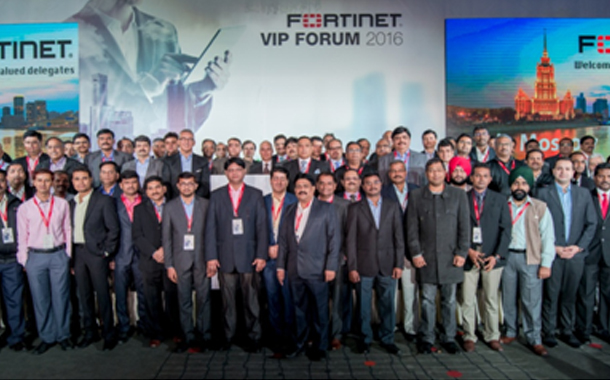Conference in Moscow underlines that a comprehensive Security Fabric is critical to strengthening a security posture
Fortinet conducted its annual Security Conference for Indian CIOs in Moscow, Russia. At the conference attended by over 100 CIOs from SAARC, Fortinet emphasised that the best way to secure complicated networked environments was simplicity and recommended the implementation of Segmentation, Universal Policy and Collaborative Intelligence as three important strategies for securing evolving environments.
Presenting at the conference, Joe Sarno, Vice President, International Emerging, MEA, Eastern Europe, India & SAARC, Fortinet said: “Data centers are evolving along with customer demands for fast and secure cloud infrastructure and services. The growth of IoT devices and traffic represents both an opportunity and a threat to today’s digital businesses. Having a comprehensive security strategy, including a single pane-of-glass view of security management and policy across IoT to Cloud, is essential in establishing a consistent security posture for an organization.”
Fortinet, has outlined 3 key strategies to help organizations in India protect their businesses:
- Segmentation – Networks need to be intelligently segmented into functional security zones. End to end segmentation, from IoT to the cloud, and across physical and virtual environments, provides deep visibility into traffic that moves laterally across the distributed network, limits the spread of malware, and allows for the identification and quarantining of infected devices.
- Collaborative intelligence – Local and global threat intelligence needs to be shared between security devices, and a coordinated response between devices needs to be orchestrated centrally.
- Universal policy – A centralized security policy engine that determines trust levels between network segments, collects real time threat information, establishes a unified security policy, and distributes appropriate orchestrated policy enforcement.
Which is why Fortinet has introduced its new Security Fabric architecture. This architecture is designed to integrate security technologies for the endpoint, access layer, network, applications, data center, content, and cloud into a single collaborative security solution that can be orchestrated through a single management interface.
A S Rajgopal, Managing Director & CEO, NxtGen Datacenter & Cloud Technologies said, “Businesses of all sizes look towards managed services to be lean and scalable. As a leading data center service provider, our customers demand high performance and an agile environment without security becoming a traffic chokepoint. The sessions and interactions with security experts at the VIP Forum has revealed that service providers can execute thier cloud stratergies without performance barriers, and also address customers’ concerns about data security and privacy with the confidence that their data is protected within the Fortinet Security Fabric. ”
Prabhu P, Director – Network & Infrastructure, Zoho Corporation said, “Online and mobile transactions have become commonplace and organizations moving to embrace and enable this new digital economy face increased security and data risks. Innovative attacks are aimed at exploiting loopholes as businesses start to share more customer data between branches, mobile users, and even through the cloud. The VIP Forum outlined a holistic security strategy to help enterprises get prepared in advance for emerging technologies and their security threats. ”


